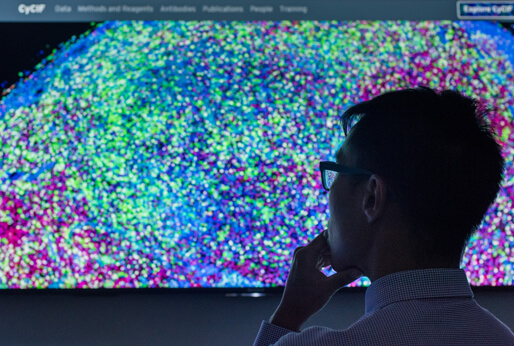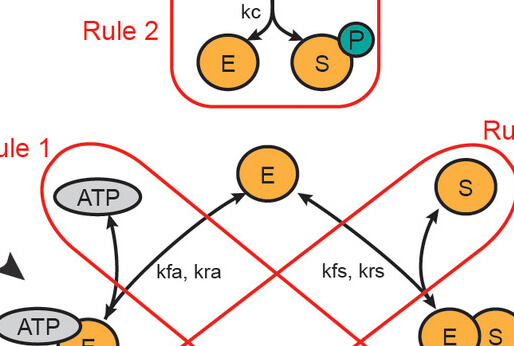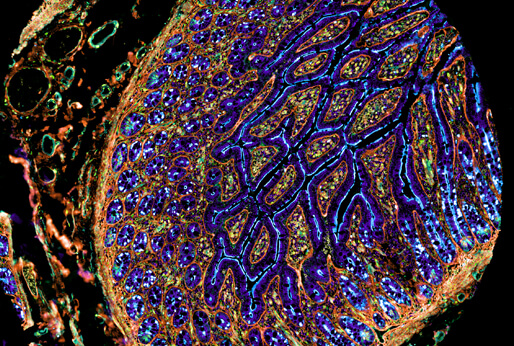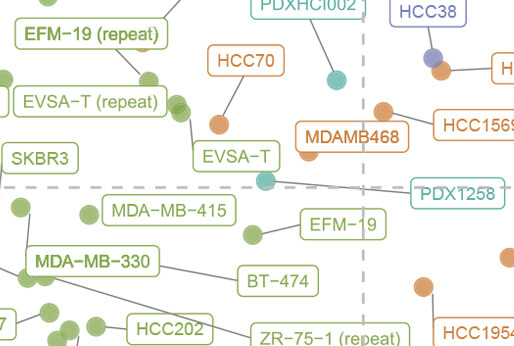LSP Platforms

Cyclic Immunofluorescence (CyCIF)
The Cyclic Immunofluorescence (CyCIF) Platform performs cyclic immunofluorescence staining and imaging to spatially profile protein targets in human and mouse tissues and tumors. The CyCIF Platform works closely with the Microscopy and Computer Vision Platform to use conventional wide-field, confocal, and super-resolution microscopes for up to 60-plex and H&E tissue imaging. We operate under a staff-assisted model to support investigators in experimental design and antibody selection, sample preparation, teaching data visualization software tools, and assisting in early-stage data processing. Our research projects also include testing the performance of new antibodies and researching new techniques and tools. In conjunction with the Information and Modeling Platform, we develop open-source software and metadata standards to tackle common challenges imposed by highly-multiplexed whole slide imaging.

Informatics and Modeling
The Informatics and Modeling Core efforts are split between conducting original research and providing computational support and infrastructure for other LSP platforms and their projects. Our research projects are focused in three areas: 1) development of methods that make -omics dataset analyses more effective and interpretable; 2) application of those methods to large-scale datasets collected by LSP scientists to elucidate pharmacological mechanisms across many different diseases and tissues; and 3) implementation and deployment of web applications and resources that allow external scientists to apply our methods to their own data.
In addition to research projects, we also support other LSP cores by providing computational consulting and encapsulating common data analysis workflows employed by scientists inside automated, easy-to-use pipelines. The effort includes leveraging existing pipeline tools and providing better documentation for common LSP workflows, as well as implementing new pipelines to address emerging data modalities. User training is enabled by numerous educational sessions/presentations, extensive documentation, and exemplar datasets.

Machine-Assisted Modeling and Analysis
The Machine-Assisted Modeling and Analysis team is developing a platform that can accelerate scientific discovery in biomedicine using a combination of text mining, knowledge assembly, mathematical modeling and causal analysis. We are pursuing approaches that use artificial intelligence to increasingly automate the interpretation of scientific literature and large experimental datasets, and also to enable sophisticated human-machine interaction and collaboration.
All our tools are available as open-source software and deployed publicly on the web. For more information, visit our team website at: https://indralab.github.io/.

Microscopy and Computer Vision
The Microscopy and Computer Vision Platform houses a variety of optical microscopes for characterizing molecular mechanisms and interactions in understanding disease. Our platform’s microscopes are versatile to handle a large variety of challenging experimental setups. Most notably, the platform works closely with the CyCIF Platform – an open-source method that is gaining extensive notability for characterizing up to 60 markers at single-cell resolutions. To date, diseased tissue from patients with cancer or COVID19 have been analyzed here. To complement studies performed at high-plex, the platform also has the capability to image tissue at high spatial resolution and live cells at high temporal resolution. The instruments are compatible with plate-based assays and slides and are regularly maintained and updated with new optical components. GPU-equipped image analysis workstations are also available for reviewing and processing image data.
The multiplexed imaging platform also works in close collaboration with the Modeling and Informatics Platform for developing novel image processing methods.

Proteomics
The Proteomics Platform implements a wide variety of advanced proteomic techniques to characterize clinically relevant and basic experimental research samples with the goal of providing mechanistic insight into disease states, drug effects, and signaling pathways. Our team advises and collaborates closely with scientists and clinicians to optimize and custom-tailor their experimental design to meet the need for obtaining the most meaningful data possible. We provide statistical analysis to facilitate biological interpretation of large multiplexed datasets.

